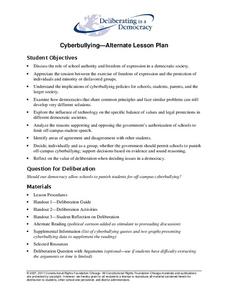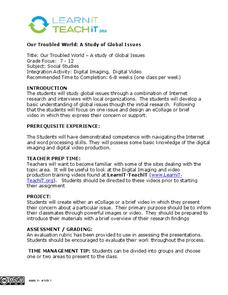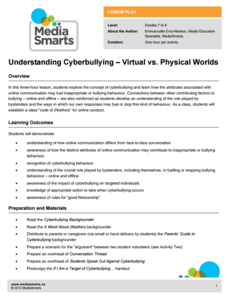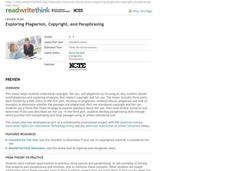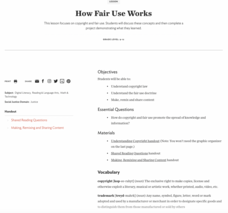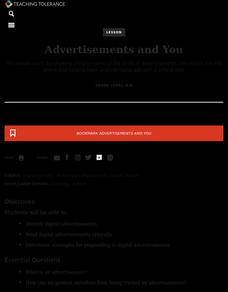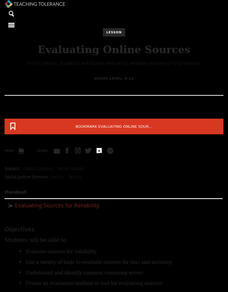Curated OER
Hate 2.0
Combat hate online by bringing it into the light. Begin by giving learners a quiz, then lead a discussion based on the issues the quiz brought up. As a class, develop strategies to confront online hate. Assign different venues to groups...
Common Sense Media
Talking Safely Online
What is the difference between online and real-life friendships? Pupils learn how to keep information private online and maintain their safety in various situations requiring online communication.
Common Sense Media
Going Places Safely
How can places on the Internet be dangerous? Youngsters draw important connections between traveling online and staying safe in the real world. They also discover three key online safety rules to guide them throughout their online...
Deliberating in a Democracy
Cyberbullying—Alternate Lesson Plan
Should schools be permitted to punish young scholars for off-campus cyberbullying? After reading a passage that details statistics about cyberbullying and Supreme Court rulings about schools' ability to limit student speech, class...
Media Smarts
Making Media for Democratic Citizenship
Pupils analyze global issues. In this video podcasting lesson plan, pupils research Internet and print sources regarding selected global development issues. Pupils plan and create video podcasts that feature their research findings.
Advocates for Human Rights
Human Rights in the U.S.
Here's a fun, creative approach to the profoundly important issue of human rights. Young citizens do three activities, two of which involve them finding images from magazines that reflect human rights of their choosing and creating a...
Curated OER
7 Habits
Students study the qualities and responsibilities of becoming a good citizen. They, in teams, produce a video of one of the habits from the 7 Habits for Highly Effective Teens program.
Curated OER
Our Troubled World: A Study of Global Issues
Young scholars analyze global issues. In this research skills lesson, students research selected global issues. Young scholars create e-collages or digital videos that feature their selected issues.
Curated OER
Living History: Documenting Our Senior Citizens Lives
Students investigate stereotypes by researching the elderly. In this senior citizen lesson, students interview elders in a rest home and video tape their experience. Students present their videos to their interview subjects after and...
Florida Center for Instructional Technology
Communicating with Mentors
Nothing says 21st century learning skills like an Internet-based collaborative learning lesson plan focused on using technology to compile and synthesize information. An embedded video shows you what collaborative learning in high school...
Deliberating in a Democracy
Cyberbullying—Lesson Plan
Learners examine cyberbullying. In this lesson on democracy, students discuss the different ways to deal with cyberbullying. They then take a position on the question of whether a democracy should allow schools to take action against off...
Media Smarts
Understanding Cyberbullying — Virtual vs. Physical Worlds
Spend a few days discussing cyberbullying with an engaging lesson plan. Opening discussion questions get the conversation started while quotes and articles continue thoughtful dialogue. Small group activities and role-play scenarios...
ReadWriteThink
Exploring Plagiarism, Copyright, and Paraphrasing
Plagiarism, copyright, and fair use are the focus of a three-part instructional activity designed to inform scholars of how to properly cite others' work. First, pupils use a KWL chart to begin thinking and discussing plagiarism. They...
Teaching Tolerance
Media Consumers and Creators, What Are Your Rights and Responsibilities?
Teach the class to separate fact from fiction. Scholars explore the topic of fake news as they read PEN America's News Consumers' Bill of Rights and discuss the rights and responsibilities outlined in the bill. Next, they read an article...
Teaching Tolerance
You Are the Product
What does it mean for a product or service to go viral? Scholars explore the topic by reading an article about the economics of social media. After reading, they complete a 3-2-1 data chart with information they learned from the text and...
Teaching Tolerance
News Consumers' Bill of Rights and Responsibilities
Believe it or not, people have rights as new consumers. Scholars read PEN America's News Consumers' Bill of Rights and Responsibilities and work in small groups to paraphrase chosen sections of the text. Next, they create and present...
Teaching Tolerance
How Fair Use Works
What's fair is fair! Using the resource, scholars discuss the key differences between fair use and copyright. Next, in small groups, pupils create and present projects that demonstrate fair use of copyrighted material, such as a song,...
Teaching Tolerance
Understanding and Evaluating Online Searches
With billions of options to choose from, how can people determine which online sources are reliable? Using an informative resource, pupils first discuss and evaluate a sample search result handout. Next, partners create a checklist for...
Teaching Tolerance
Social Media for Social Action
Engage in activism, not slacktivism! Scholars discuss social media and the Internet as tools for social change. Next, they engage in a close reading strategy called Thinking Notes as they read an article about social media activism.
Teaching Tolerance
Understanding Online Searches
Discover what's behind an online search. Scholars read a handout and engage in discussions to learn how to critically evaluate online search results. Then, working in small groups, they create posters listing their demands for search...
Teaching Tolerance
Activism Online
People can make a difference in the world without leaving their homes. Using an eye-opening resource, scholars complete a handout as they consider the strengths and weaknesses of the Internet as a tool for social activism. Finally,...
Teaching Tolerance
Advertisements and You
Watch out for clever advertisements! Using the lesson plan, scholars learn how to identify online ads and respond to them critically. They then use what they've learned to develop a list of strategies to evaluate web pages.
Teaching Tolerance
Evaluating Online Sources
Newspapers, television, social media ... how do people get their news? Using the informative resource, scholars locate and verify credible sources of information. Working in small groups, they discuss strategies for evaluating the...
Health Smart Virginia
Mental Health/Social Emotional Skills
Looking for social-emotional resources? Check out this seven-page packet that includes activity and lesson ideas, as well as links to information resources that support the social and emotional development of tenth graders.





